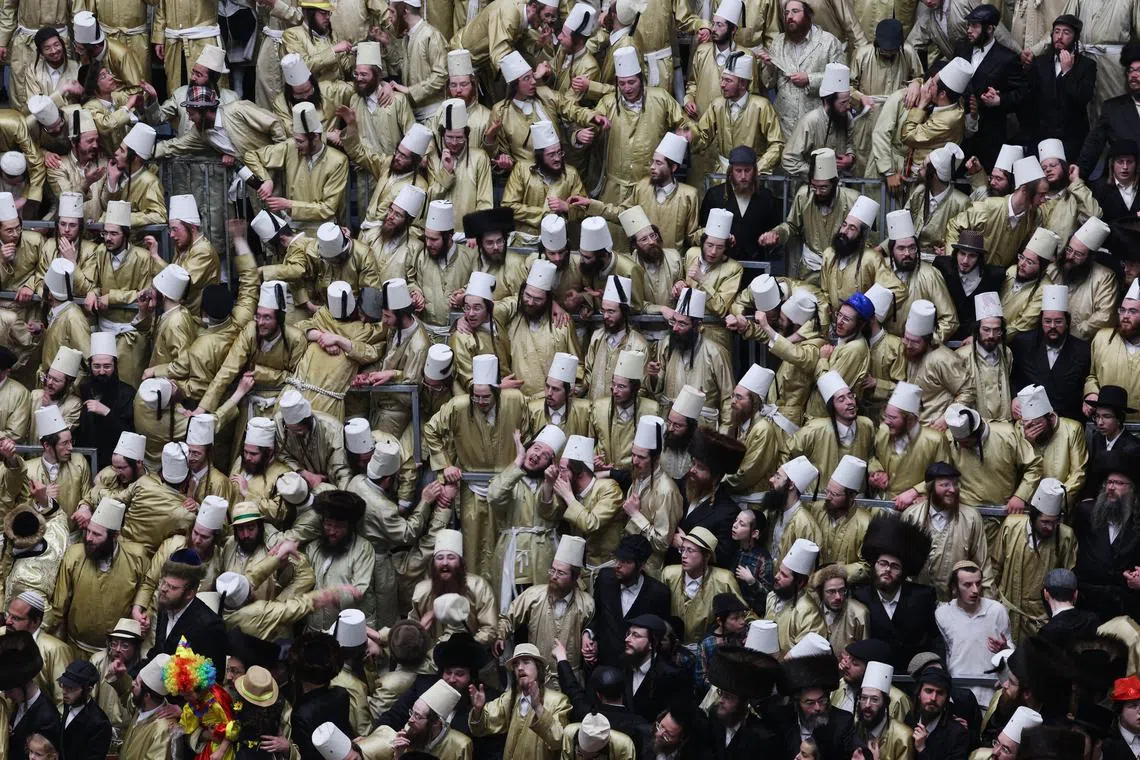Netanyahu coalition challenged over pressure to formalise ultra-Orthodox exemption from army
Sign up now: Get ST's newsletters delivered to your inbox

Ultra-Orthodox Jews celebrating the Jewish holiday of Purim in Jerusalem in March.
EPA-EFE
BNEI BRAK, Israel – One of Israel’s most divisive domestic issues has reared itself again to challenge Prime Minister Benjamin Netanyahu, after a group in the ruling coalition said it would bring the government down unless it exempts ultra-Orthodox Jews from army service.
Some members of United Torah Judaism, one of two ultra-Orthodox Jewish parties in the coalition, said in a letter that they would vote against the Budget if the government did not pass a new law formalising exemptions for religious students.
“If this matter is once again sidelined or delayed for any reason, we will not be able to continue as partners in the coalition,” said the March 6 letter signed by Israeli Housing Minister and party chairman Yitzhak Goldknopf and two others.
The government must pass the Budget by the end of March or call snap elections. United Torah Judaism holds seven seats in the Knesset, Israel’s Parliament.
It is too early to predict the consequences. Mr Netanyahu, Israel’s longest-serving prime minister, is a proven master at smoothing over disagreements in his coalitions.
An ultra-nationalist group that quit the government over the ceasefire in Gaza in January announced on March 18 it was returning.
But pollster Mitchell Barak, who worked for Mr Netanyahu in the 1990s, said this time, ultra-Orthodox politicians appeared unwilling to compromise, and the Israeli Prime Minister might have to look outside the coalition for support to pass the Budget, an extraordinary step.
“He’s going to look for someone who can compromise, save him, and be that ‘freyer’,” he said, speaking before the ultra-nationalists announced their return to the coalition and using a Yiddish word for someone who lets others take advantage of him. “That’s how he operates.”
The Israeli Prime Minister’s office declined to comment on the ultra-Orthodox ultimatum and whether Mr Netanyahu believed the Budget could pass without their support.
Military strained
In Israel, military service is mandatory at age 18, after which Israelis become reservists liable to be called up for training or deployment.
But dating back to Israel’s founding in 1948, it made an exemption for ultra-Orthodox communities, known as Haredim, whose young men mainly dedicate their lives to studying religious texts in academies known as “yeshivot”.
Those communities were initially small but have grown rapidly in the following decades.
According to government data, there are now 1.4 million Haredim, accounting for about 14 per cent of the population, deepening resentment among other Israelis who are conscripted.
In 2017, the Supreme Court ruled that the exemption was unconstitutional, and in 2024, it ordered the military to conscript “yeshiva” students.
Legal experts say the only way to restore the exemption would be to pass a new law enshrining it.
Members of the Haredi community say they would resist any attempt to conscript their children.
“They can put us in prison,” said Mr Yehoshua Menuchin at his home in Bnei Brak, a densely populated city close to Tel Aviv where many Haredim live.
Mr Menuchin, who has a 19-year-old son who is not serving, said the debate was driven by politics, rather than by genuine military need.
“If it’s a matter of survival, like an Arab invasion, then the Haredim will be the first to volunteer in order to save lives. But as long as it is political, it won’t ever happen,” he said.
But 18 months into war in Gaza, and major military operations in the West Bank and Lebanon
“They don’t know what 30 days of reserve duty a year is, and they don’t know what it is to dread that knock on the door,” centrist opposition lawmaker Elazar Stern, a former general, told Reuters, referring to the moment a parent learns of a child’s death in service.
Divine intervention
The Haredim live in insular neighbourhoods centred around strict religious observance, with their own schools that largely eschew maths and science.
They have twice as many children as the national average, rely heavily on state welfare and charity, and those who work are often in low-paying jobs.
They believe that sending their children to the military is an existential threat, fearing that exposure to secular Israelis and outside influences could undermine their way of life.
“I know one thing: we must go the way the Torah instructs us,” said Mr Meir Zvi Bergman, one of Israel’s most widely followed Haredi rabbis. “God does not want us to go, so we won’t go.”
The army says it is working to create conditions to make it easier for more Haredim to serve, such as dedicated battalions with strict religious practices, including regular prayer and gender segregation.
“The responsibility to defend the country must be shared fairly,” Mr Eyal Zamir, Israel’s new chief of the military staff


